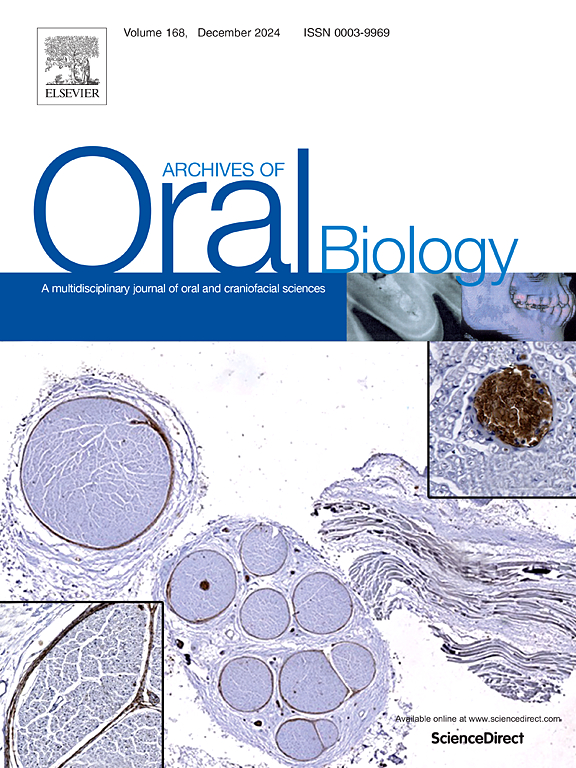Genetic evidence strengthens the connection between emotional disorders and TMD-related pain: A two-sample Mendelian randomization study
IF 2.2
4区 医学
Q2 DENTISTRY, ORAL SURGERY & MEDICINE
引用次数: 0
Abstract
Objectives
This study aims to evaluate the genetic association between emotional disorders and TMD-related pain through two-sample Mendelian randomization analysis.
Design
Single-nucleotide polymorphisms (SNPs) related to emotional disorders (worry, nerves, or depression) were selected from genome-wide association studies (GWAS) from UK Biobank consortia, and related these to SNPs from FinnGen consortia. The inverse-variance weighted (IVW) was used as the primary effect estimate between emotional disorders and TMD-related pain, and various methods were applied to test the reliability and stability of the results, namely MR-Egger and weighted median.
Results
The Mendelian randomization analysis showed that there was a positive correlation between emotional disorders and TMD-related pain, including worry group (IVW odds ratio (OR) = 3.86, 95 % confidence interval (CI) = 1.67–8.91), nerves group (IVW OR = 11.20, 95 % CI=2.04–61.64) and depression group (IVW OR = 3.32, 95 % CI=1.24–8.90). MR-Egger intercept and MR-PRESSO global test did not suggest evidence of horizontal or directional pleiotropy. Cochran’s Q test showed that there was no heterogeneity between instrumental variables.
Conclusions
This study provides genetic evidence that strengthens the connection between emotional disorders and TMD-related pain, which has important implications at the causal level as well as throughout the treatment process of TMD-related pain.
遗传证据加强了情绪障碍和tmd相关疼痛之间的联系:一项双样本孟德尔随机化研究。
目的:本研究旨在通过双样本孟德尔随机化分析,评估情绪障碍与tmd相关疼痛的遗传关系。设计:从英国生物银行联盟的全基因组关联研究(GWAS)中选择与情绪障碍(焦虑、神经或抑郁)相关的单核苷酸多态性(snp),并将其与FinnGen联盟的snp进行关联。采用反方差加权(inverse-variance weighted, IVW)作为情绪障碍与tmd相关疼痛之间的主要效应估计,并采用多种方法检验结果的可靠性和稳定性,即MR-Egger和加权中位数。结果:孟德尔随机化分析表明,有一个积极的情绪失调和TMD-related疼痛之间的相关性,包括担心集团(IVW比值比(或) = 3.86,95 %可信区间(CI) = 1.67 - -8.91),神经组(IVW或 = 11.20,95 % CI = 2.04 - -61.64)和抑郁组(IVW或 = 3.32,95 % CI = 1.24 - -8.90)。MR-Egger截距和MR-PRESSO全球测试没有显示水平或方向多效性的证据。Cochran’s Q检验显示工具变量之间不存在异质性。结论:本研究提供了加强情绪障碍与tmd相关疼痛之间联系的遗传学证据,这在因果层面以及整个tmd相关疼痛的治疗过程中都具有重要意义。
本文章由计算机程序翻译,如有差异,请以英文原文为准。
求助全文
约1分钟内获得全文
求助全文
来源期刊

Archives of oral biology
医学-牙科与口腔外科
CiteScore
5.10
自引率
3.30%
发文量
177
审稿时长
26 days
期刊介绍:
Archives of Oral Biology is an international journal which aims to publish papers of the highest scientific quality in the oral and craniofacial sciences. The journal is particularly interested in research which advances knowledge in the mechanisms of craniofacial development and disease, including:
Cell and molecular biology
Molecular genetics
Immunology
Pathogenesis
Cellular microbiology
Embryology
Syndromology
Forensic dentistry
 求助内容:
求助内容: 应助结果提醒方式:
应助结果提醒方式:


